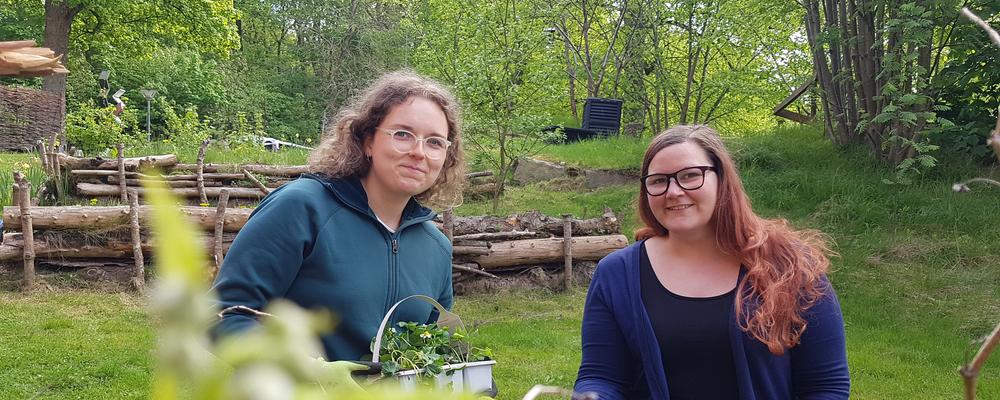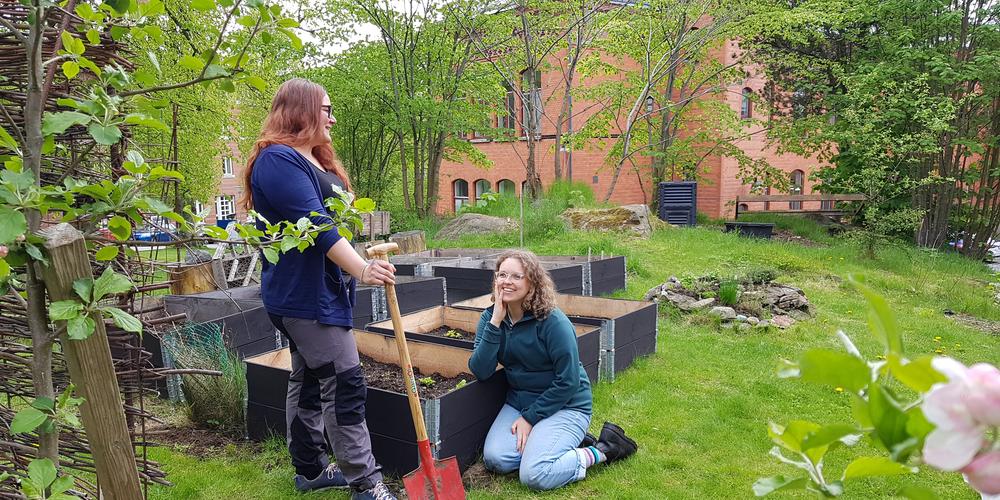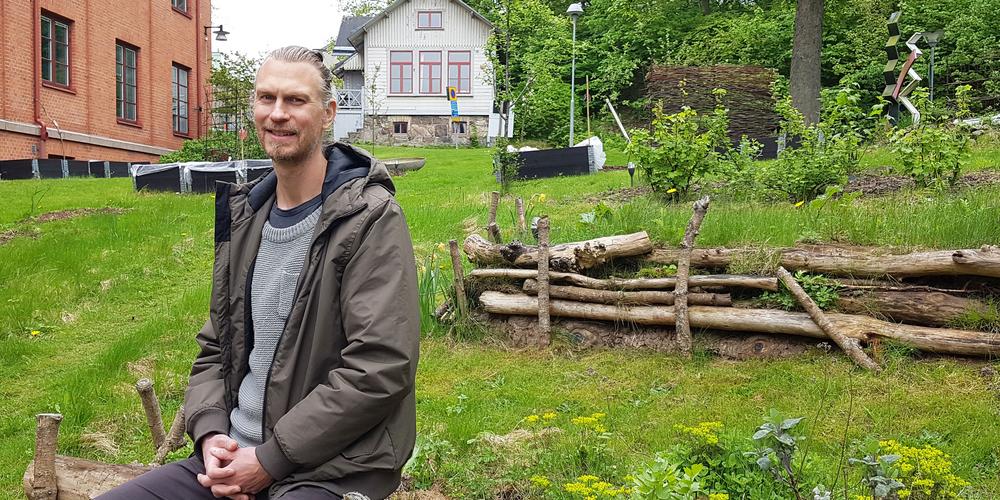
- Home
- News and events
- Find news
- Urban gardening on campus - sustainability in practice
Urban gardening on campus - sustainability in practice
In one of Campus Linné's quiet courtyards there is a fantastic garden. It is created by Urban Gardening at Global Studies and students and employees at the University of Gothenburg and Chalmers are welcome to join.
"Both beginners and experienced cultivators are equally welcome," says Birgitta Kaskmaa and Kajsa Urge, two of the enthusiasts behind the project.
"We also hope to inspire more urban gardens on different campuses. It gives so much, not least when it comes to the sustainability perspective."
An oasis
It is a real oasis they have created, just a stone's throw from Linnéplatsen. The fruit trees stand neatly in a row, different kinds of vegetables thrive in well-organized pallets and in the spiral-shaped herb garden, thyme, mint, rosemary and other herbs are growing.
To get more people to experience the satisfaction of growing vegetables themselves, is an important part of the project.
"The feeling of pulling something up from seed to plant is hard to beat. Some people who come here have never touched soil before. Here you can learn the basics and try it out together with others," says Kajsa Urge and Birgitta Kaskmaa.

New friends
The social aspect is just as important. In the garden, students and employees from different parts of the university meet and in addition to plants; contacts, ideas and friendships are also cultivated.
"Many international students also come here," says Kajsa and Birgitta.
"The idea is that it should be a low-threshold activity. It should be easy to come here, easy to be part of it. It is often easier to get to know new people if you have something to gather around."
It is also a good environment for interdisciplinary studies and cross-disciplinary meetings.
"One way to develop that part could be to arrange lectures here. Partly because it is such a beautiful environment and partly to inspire new perspectives on different subject areas. There is hardly anything that cannot be linked to plants, life, garden or cultivation in one way or another."
Relaxing
The area belongs to the part of Campus Linné called KK2, a red brick house situated between Annedalsseminariet and Psykologen. In addition to the garden itself, the project also has a small house. Here you can meet and plan, have coffee and pre-cultivate. One of the rooms also has space for all garden utensils.
"It's so relaxing to come here, especially now that I'm writing my thesis," says Birgitta Kaskmaa.
"I'll clear weeds, cut and see how beautiful it's going to be. It’s a quick reward in contrast to the much longer-term reward that writing on your thesis is."
This year's crops include kale, potatoes, spinach, lettuce, carrots, kohlrabi, beetroot, tomato, cucumber, strawberries, raspberries and gooseberries.
"And herbs, of course," says Kajsa Urge. "Thyme, mint, rosemary, dill, chives, lemon balm... Most often we get good harvests but rabbits, deer and snails take some. Two wild ducks have moved in too. What if they could start eating snails - that would be great."
Sustainability in practice
Andréas Litsegård is senior lecturer in peace and development research at the School of Global Studies. He also works as an environmental representative at the department.
"This is a really good example of how visions and goals around sustainability can be transformed into practical reality," he says. "For us at Global studies, this project is part of our work on the climate and we want to continue to develop it, for example with money from the Climate Fund."

He sees great development opportunities for urban gardening at the university, both in terms of teaching and research.
"For example, it can be a way to interact theoretical studies with practice. It is so much easier to understand what sustainability issues are about when you actually get to see it in practice. And urban gardening can be linked to so much, such as consumption, economy, health, energy and technology."
Karolina Ganhammar, property manager at the university, also sees great opportunities for this type of activities.
"It ties in with several of the goals and strategies in the university's local supply plan," she says. "For example, creating cross-disciplinary meeting places and create inviting environments. And, of course, also the work to promote ecological, social and economic sustainability."
Continuity needs to be ensured
The project is based on non-profit work and currently has an annual budget of 8,000 SEK for the purchase of plants and equipment. Half of the funds come from the Department of Global Studies and the rest from Sahlgrenska Academy Students for Sustainability (SASS).
"Even if the non-profit commitment is great, it would have been preferable if urban gardening could be supported with some kind of central administration at the university," says Kajsa Urge and Birgitta Kaskmaa. "To ensure continuity and take advantage of the great interest."
Contact
Urban Gardening at Global Studies is open to students and employees at the University of Gothenburg and Chalmers. For more information, if you are interested to join, and/or if you would like to have advice on urban gardening, please email: urbangardeninggothenburg@gmail.com
For more information, please visit the project's Facebook and Instagram page:
https://www.facebook.com/urbangardeningatglobalstudies
https://www.instagram.com/urbangardeninggu